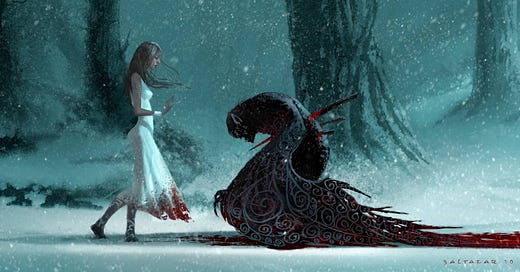A Wrong Lesson Learned Somewhat Misremembered
“Counterpoint” is the wrong word. It’s not the word I wanted. But, it’s the best I can come up with.
The unfound word was sought out in a memory nestled in the undergrowth of my school years. My music teacher was an epic guy. He had a severe stammer that made his face contort in ways that horrified people seeing it happen for the first time, and a certain wily wisdom about him born of street smarts and a rule-bending bravado. In another life, he would have made a great criminal, or for that matter… a great music teacher — we all failed our exams miserably. With the benefit of now knowing that school’s only redeeming quality is the characters you encounter, he is the source of many ridiculous and oddly fond moments looking back.
In one of our classes he talked about a certain musical concept that stayed with me. It described a part of a song or piece that was equally as complex and impressive as the main melody or focal point, but nonetheless was secondary and more in the background. It would seem that there isn’t actually a word for this. Maybe he made it up, or got the definition of another word totally wrong. But it is a real thing.
Counterpoint is a technique where two or more independent melodies are played simultaneously in a way that creates a harmonious whole. Each melody retains its own distinct character and follows its own unique rhythm, but when played together, they create a harmonically rich and complex texture. Johann Sebastian Bach — unbridled baroque baller who fathered 20 children and birthed an immortal catalogue of music — is the most famous exponent of this technique. This makes his music difficult to remember for pianists since there are multiple ‘voices’ you have to keep track of as opposed to one melody that sings above the rest of the music.
Secondary Characters and Side Plots
The image prompt at the top of the post reminds me of ‘A Song of Ice and Fire’, specifically, the opening scene. It features a character who leaves a lasting impression, despite dying… nearly right away. After encountering ‘The Others’ (who he knows will be his certain death) while ranging north of The Wall he delivers what I consider to be a badass line:
“I am not going back to Castle Black a failure on my first ranging. Dance with me then.”
— Waymar Royce
It’s just so bold, to introduce such a great character at the beginning of a story knowing that he doesn’t last much longer than the first page. Giving him that line, what a gift!? One of the central characters could have gotten that line at a climactic moment, but no, George R.R. Martin bestows it on someone who is barely a minor character.
This is a literary example of whatever the hell that musical word is that I couldn’t think of, or didn’t even exist. When something is so much better than it needs to be, it soars in a way that’s hard to describe. It’s like a witty comment from a stranger that they didn’t need to make, or a kind gesture for the sake of it.
It’s unnecessary brilliance or simply, incidental beauty.





My 8th grade English teacher, who was completely mad and would have made a brilliant college professor, did strange things like hang a blue feather from the wall clock and a rotting carrot from the overhead projector. One day he announced that he would no longer be using our names but would instead be seating us according to the Dewey Decimal System. We would each be assigned a number, with the option to earn back our names, should we so desire. He was epic, too.
Ok after reading this post I probably spent way too much time trying to find the word you describe but to no avail, yet finding lots of other musical words along the way. I didn't realise music is so complicated and very technical!